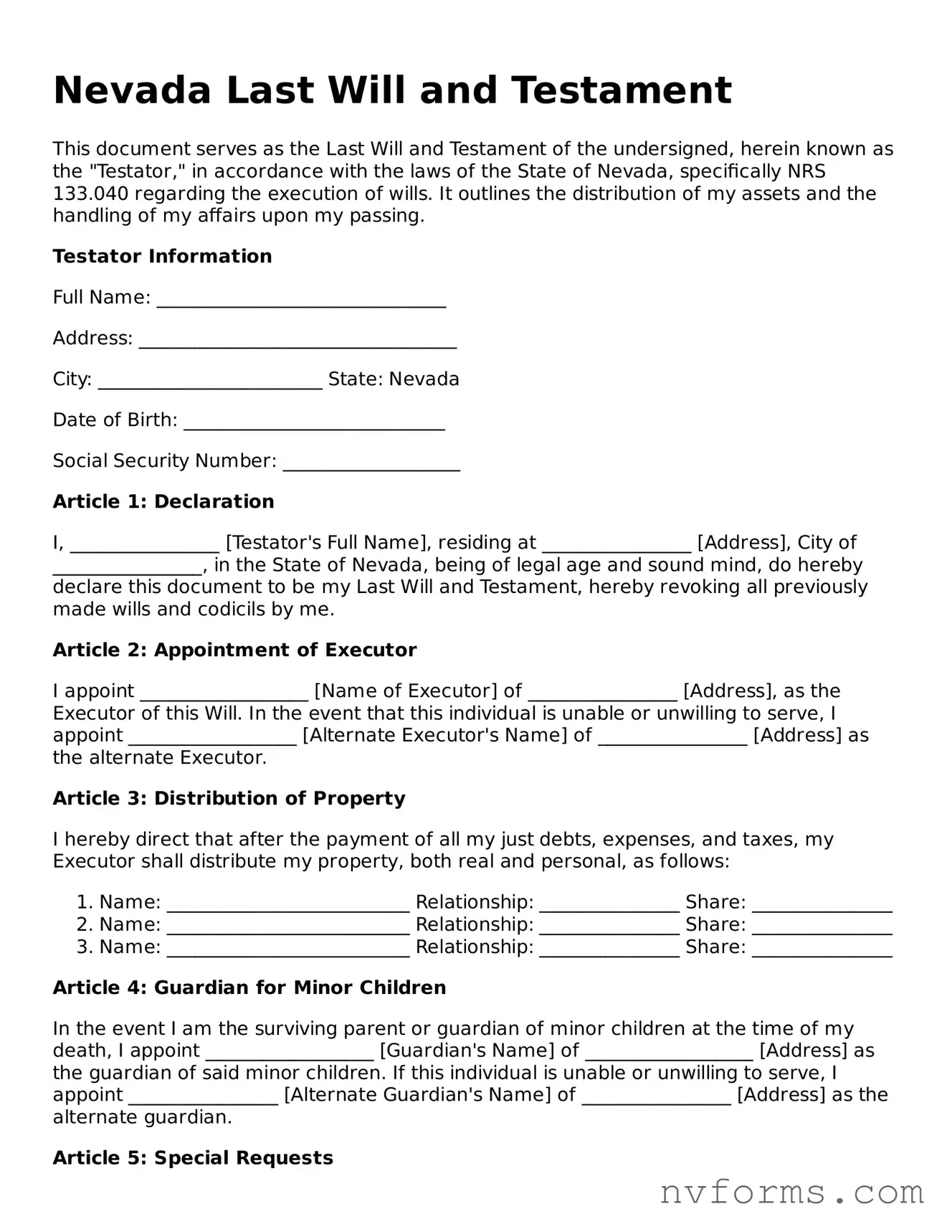Nevada Last Will and Testament
This document serves as the Last Will and Testament of the undersigned, herein known as the "Testator," in accordance with the laws of the State of Nevada, specifically NRS 133.040 regarding the execution of wills. It outlines the distribution of my assets and the handling of my affairs upon my passing.
Testator Information
Full Name: _______________________________
Address: __________________________________
City: ________________________ State: Nevada
Date of Birth: ____________________________
Social Security Number: ___________________
Article 1: Declaration
I, ________________ [Testator's Full Name], residing at ________________ [Address], City of ________________, in the State of Nevada, being of legal age and sound mind, do hereby declare this document to be my Last Will and Testament, hereby revoking all previously made wills and codicils by me.
Article 2: Appointment of Executor
I appoint __________________ [Name of Executor] of ________________ [Address], as the Executor of this Will. In the event that this individual is unable or unwilling to serve, I appoint __________________ [Alternate Executor's Name] of ________________ [Address] as the alternate Executor.
Article 3: Distribution of Property
I hereby direct that after the payment of all my just debts, expenses, and taxes, my Executor shall distribute my property, both real and personal, as follows:
- Name: __________________________ Relationship: _______________ Share: _______________
- Name: __________________________ Relationship: _______________ Share: _______________
- Name: __________________________ Relationship: _______________ Share: _______________
Article 4: Guardian for Minor Children
In the event I am the surviving parent or guardian of minor children at the time of my death, I appoint __________________ [Guardian's Name] of __________________ [Address] as the guardian of said minor children. If this individual is unable or unwilling to serve, I appoint ________________ [Alternate Guardian's Name] of ________________ [Address] as the alternate guardian.
Article 5: Special Requests
I may also attach to this Will any special requests, instructions, or information regarding the handling of my estate or my personal wishes, which, although not mandatory, are to be given due consideration by the Executor and Guardian.
Article 6: Signatures
This Will shall be effective upon my death and shall be executed on this date: _______________.
In the presence of the undersigned witnesses, who affirm below in the presence of each other and in my presence, I have signed and sealed this Last Will and Testament on this __________ day of _________________, 20__.
_________________________ [Signature of Testator]
_________________________ [Printed Name of Testator]
Witnesses:
- Name: ________________________ Signature: ________________________ Date: _______________
- Name: ________________________ Signature: ________________________ Date: _______________
This document was signed and declared by ____________ [Testator's Full Name], as the Testator's Last Will and Testament, in our presence, who in his/her presence and in the presence of each other, have hereunto subscribed our names as witnesses on the date indicated above.
The Testator has requested that I, __________________ [Name of Executor], sign in acknowledgment of my understanding and acceptance of the responsibilities of Executor.
_________________________ [Signature of Executor]
_________________________ [Printed Name of Executor]
Certification of Will
This Last Will and Testament was completed in accordance with the laws of Nevada and represents the Testator's wishes. It may be amended or revoked by the Testator at any time, with an appropriately executed and witnessed document.

